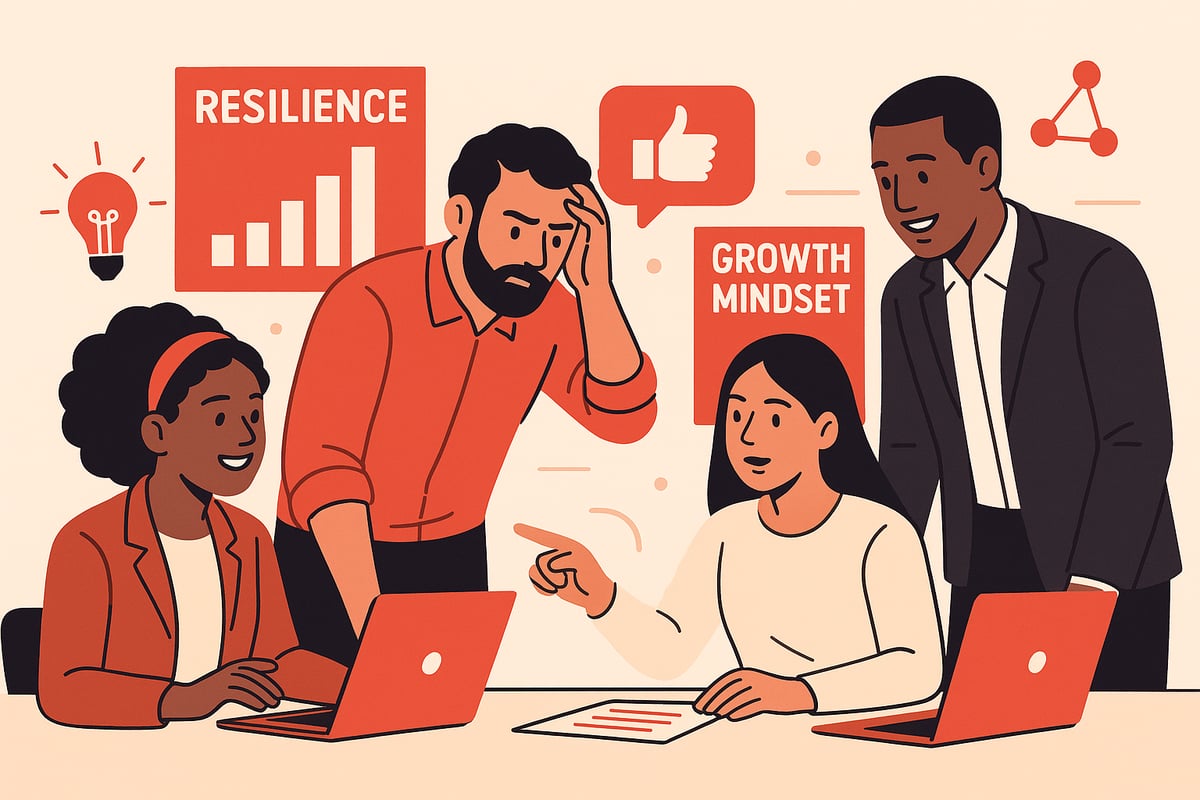Entrepreneurship Lessons Guide: Essential Insights for 2025
Did you know that experts predict a record surge in new startups and entrepreneurial ventures in 2025? The world of business is transforming rapidly, shaped by technological breakthroughs, shifting global trends, and evolving consumer expectations.
As the landscape changes, entrepreneurs face both exciting opportunities and unique challenges. Staying ahead means seeking out fresh, actionable advice that truly reflects today’s dynamic environment.
That’s why this guide focuses on the most essential entrepreneurship lessons for 2025, ensuring founders and aspiring business owners gain practical, relevant strategies for success.
Inside, you’ll discover emerging trends, vital mindset shifts, skill-building tips, market adaptation tactics, ways to leverage technology, and strategies for building resilient businesses.
The Evolving Entrepreneurial Landscape in 2025
The world of startups is transforming at lightning speed. Entrepreneurs in 2025 are navigating a landscape shaped by technology, shifting values, and new global dynamics. Mastering entrepreneurship lessons is now more crucial than ever for those aiming to stand out and thrive.

Key Trends Shaping Entrepreneurship
Entrepreneurship lessons in 2025 start with understanding the key trends driving change. Digital-first startups and remote-first models are leading the way, with over 60% of new ventures in 2024 being digital-native. Sustainability and purpose-driven missions are now at the heart of many new businesses.
Global market access is more attainable, and cross-border collaboration is fueling innovation. Economic uncertainty and inflation continue to impact startup funding, while regulatory shifts bring both challenges and opportunities. For a deeper dive into these trends, check out this comprehensive overview on Entrepreneurship in 2025: Trends and Insights.
The rise of SaaS platforms and digital marketplaces demonstrates how quickly the environment is evolving. Staying current with these entrepreneurship lessons is essential for every founder.
New Challenges Facing Entrepreneurs
The entrepreneurship lessons of today highlight new obstacles. As barriers to entry drop, competition intensifies for startups in nearly every sector. Navigating non-linear growth and unpredictable revenue streams is now the norm, not the exception.
Adapting to rapidly shifting consumer behaviors is a daily requirement. Social media algorithms can make or break audience growth and monetization plans. Founders must balance constant innovation with operational efficiency, all while market unpredictability looms large. In fact, 45% of founders now cite this as their top concern.
Opportunities for Growth and Differentiation
Despite the hurdles, entrepreneurship lessons reveal exciting opportunities. Niche markets and hyper-personalization offer founders a way to stand out. Building tight-knit communities around products or services can drive loyalty and advocacy.
The creator economy is opening new doors for visibility, as seen with YouTube creators evolving into full-fledged business owners. Agile business models help startups capture emerging trends quickly. Niche-focused startups now report 30% higher customer retention rates, underscoring the value of tailored offerings.
The Shift from Traditional to Modern Entrepreneurship
A major takeaway from recent entrepreneurship lessons is the move from brick-and-mortar to hybrid and virtual models. Lean startup principles, minimum viable product (MVP) launches, and rapid experimentation are replacing slow, traditional approaches.
Startups are now expected to pivot quickly based on real-time analytics and feedback. Continuous learning and upskilling have become non-negotiable for founders. Notably, 70% of successful startups in 2024 pivoted at least once during their early stages.
Globalization and the Rise of Entrepreneurial Ecosystems
Entrepreneurship lessons for 2025 also center on globalization. Startup ecosystems are no longer limited to Silicon Valley. Regional hubs and cross-border partnerships are thriving, with European and Asian accelerators leading innovation.
Networking and knowledge sharing are now key competitive advantages. Over half of founders participate in at least one global accelerator program, reflecting the power of community and ecosystem support. Embracing these global connections is vital for the next generation of entrepreneurs.
Building the Entrepreneurial Mindset for 2025
Success in 2025 will depend on more than just a great business idea. Founders must adopt a dynamic mindset, ready to navigate uncertainty and seize new opportunities. The right attitude is a foundation for all entrepreneurship lessons, shaping every decision and outcome.

Embracing Nonlinearity and Resilience
Modern entrepreneurship lessons start with embracing the unpredictable nature of business. Growth is rarely a straight line. Founders face setbacks, failed launches, or sudden shifts in the market. The ability to adapt, learn from mistakes, and keep moving forward is essential.
Consider the example of a founder who pivots after a product flop, gathering feedback and relaunching with new features. This resilience is what separates thriving businesses from those that stall. According to recent studies, 52% of entrepreneurs recognize nonlinear revenue as their top challenge.
If you want to dive deeper into how mindset and strategy help startups overcome competition, you can explore Mindset and startup competition. These entrepreneurship lessons are key for surviving and thriving in 2025.
Cultivating a Growth-Oriented Attitude
Entrepreneurship lessons in 2025 emphasize the importance of continuous learning. Instead of chasing perfection, founders should seek feedback, iterate, and improve over time. Early adopters can help shape products through open communication and feedback loops.
A growth mindset means welcoming constructive criticism and using it as a tool for progress. Data shows that 65% of startups succeed only after multiple iterations. This approach is what allows entrepreneurs to move quickly and stay ahead of the curve.
By valuing learning over perfection, you set yourself up to make smarter decisions and adapt your business for long-term success.
Mastering Self-Promotion and Visibility
Standing out in crowded markets is no easy feat. One of the most practical entrepreneurship lessons is to build both personal and business brands. Social media platforms like LinkedIn and Instagram enable founders to share their stories, connect with audiences, and showcase their expertise.
Effective storytelling, coupled with calls to action, helps convert followers into loyal customers. For example, entrepreneurs who post regularly and engage with their audience often build more trust and drive higher conversions.
Remember, visibility is not just about being seen. It is about creating meaningful connections that fuel your growth.
Understanding and Navigating Human Behaviors
Entrepreneurship lessons are not just about products or profits—they are also about people. Understanding customer motivations, skepticism, and objections is vital. Founders must learn to handle criticism, respond to negative feedback, and turn skeptics into advocates.
Transparency and authenticity help build credibility. When you address concerns openly, customers are more likely to trust your brand. Recent data shows that 40% of founders see online reputation as a major business factor.
Learning to navigate human behaviors is a skill that can set your business apart in 2025.
Knowing When and How to Ask for Help
No entrepreneur succeeds alone. One of the most valuable entrepreneurship lessons is recognizing when to seek support. Mentorship, mastermind groups, and peer networks offer fresh perspectives and can spark breakthroughs.
For instance, many founders attribute key successes to advice gained in community settings. Balancing external input with your intuition ensures you stay true to your vision while benefiting from collective wisdom.
Research shows that entrepreneurs with mentors are 33% more likely to succeed. Building a support network is not just smart—it is essential for growth and resilience.
Essential Skills and Capabilities for the Modern Entrepreneur
To thrive in 2025, modern founders must master a diverse set of capabilities. These entrepreneurship lessons go beyond traditional business know-how, touching every facet of running and growing a startup. Whether you are just starting or scaling, the right skills will set you apart.

Multidisciplinary Skill Development
Entrepreneurs in 2025 wear many hats. One of the most valuable entrepreneurship lessons is the importance of learning across functions such as sales, marketing, finance, and technology. Founders who master content creation, digital tools, and analytics are better equipped to adapt.
Consider this table summarizing essential skills:
| Function | Key Skills | Benefit |
|---|---|---|
| Marketing | Content creation | Brand visibility |
| Sales | Value-based messaging | Higher conversions |
| Finance | Budgeting, forecasting | Sustainable growth |
| Technology | Automation, analytics | Efficiency |
Curiosity and cross-functional collaboration help founders solve problems creatively and drive innovation. In fact, 75% of solo founders report learning new skills outside their core expertise, underscoring the need for ongoing multidisciplinary growth.
Sales and Customer-Centric Communication
Another core entrepreneurship lessons takeaway is the shift from focusing on product features to highlighting customer benefits. Today’s buyers want to know how your solution fits their needs, not just what it does. Framing offerings around value leads to higher engagement and conversions.
- Craft clear calls to action (CTAs) in every message.
- Use storytelling on social media to connect emotionally.
- Gather and act on customer feedback to refine messaging.
Businesses with effective CTAs see 20% higher engagement rates. Mastering sales communication is crucial, helping entrepreneurs turn conversations into loyal customers and advocates.
Process Optimization and Time Leverage
Scaling a startup means working smarter, not just harder. Process optimization is an entrepreneurship lessons pillar, enabling founders to design repeatable systems for efficiency. Automating routine tasks with SaaS tools frees up time for strategy and growth.
- Map out your key processes step-by-step.
- Identify tasks that can be automated or delegated.
- Use workflow platforms to streamline team collaboration.
According to TechCrunch, startups with process automation grow 30% faster. Optimized processes reduce errors, save time, and let founders focus on high-impact activities.
Strategic Financial Acumen
Understanding the financial side of business is a non-negotiable entrepreneurship lessons element. Modern entrepreneurs must read financial statements, analyze key drivers, and balance investment with cash flow management. Financial analysis informs crucial pivot decisions and long-term strategies.
For a deeper dive into this essential skill, explore Finance essentials for startups.
Financially literate founders have a 40% higher survival rate after year two. Mastering these concepts can be the difference between thriving and closing shop.
Learning from Current Roles and Experiences
Every experience counts on the entrepreneurship journey. One of the often-overlooked entrepreneurship lessons is leveraging skills from previous roles—whether in product management, sales, or customer service—to tackle startup challenges.
- Apply lessons learned in past jobs to new problems.
- Network within and outside your industry for fresh perspectives.
- Share insights with peers to accelerate collective growth.
Data shows 60% of successful entrepreneurs credit prior work experience for their core competencies. Learning from what you already know accelerates your path to success.
Market Adaptation and Customer Focus in 2025
Staying competitive in 2025 means entrepreneurs must master market adaptation and keep customers at the center of every decision. As the business world shifts rapidly, applying the right entrepreneurship lessons can help founders identify, respond to, and even predict market changes.

Achieving Product-Market Fit in a Fast-Changing World
Product-market fit is the holy grail for startups, but in 2025, the path is anything but linear. Rapid validation is now essential. Many founders launch MVPs, gather feedback from early adopters, and iterate quickly. This approach is a core part of modern entrepreneurship lessons.
For example, startups that test early and refine based on real user input are twice as likely to reach product-market fit. The speed of iteration can make or break a business, especially as trends shift overnight. Adopting these practices ensures your solution truly meets evolving customer needs.
Pivoting Strategies and Embracing Experimentation
Markets rarely stand still, and neither should your business. Successful entrepreneurs know when to pivot, using data and customer signals to guide their decisions. This flexibility is one of the most valuable entrepreneurship lessons for 2025.
Take companies that shift business models in response to changing user behaviors. Instead of clinging to original plans, they embrace agile execution and experiment with new approaches. According to recent Entrepreneurship Trends That Will Change Business in 2025, top-performing startups pivot within their first 18 months, making adaptation a competitive advantage.
Hyper-Personalization and Customer Experience
Customers today expect tailored experiences. Entrepreneurship lessons now emphasize the power of hyper-personalization, using data analytics to deliver solutions designed for specific needs. Brands that use customer insights to personalize offers build stronger loyalty.
For example, companies leveraging analytics can boost customer retention by 25%. Building communities around shared values and delivering memorable experiences sets startups apart in crowded markets. Personalization is not just a buzzword—it is a growth driver.
Leveraging Community and Network Effects
Word-of-mouth and network effects are more powerful than ever. Building a loyal community around your brand can triple your growth rate. Modern entrepreneurship lessons encourage founders to create ambassador programs and nurture online spaces where customers connect and share.
Consider how peer referrals and active communities contribute to organic growth. By focusing on community, founders unlock exponential opportunities that paid marketing alone cannot achieve. Community-first thinking is a proven path to sustainable expansion.
Monitoring and Responding to Market Feedback
Continuous feedback is the engine of improvement. Setting up regular feedback loops allows entrepreneurs to track customer sentiment and spot new trends quickly. This practice is central to the most effective entrepreneurship lessons for 2025.
For instance, founders who monitor key customer metrics and analytics can pivot or enhance offerings before issues escalate. Staying responsive to feedback ensures your business remains relevant and resilient, whatever comes next.
Harnessing Technology and Innovation for Competitive Advantage
Technology is at the heart of entrepreneurship lessons for 2025. Staying ahead means more than adopting new tools; it’s about weaving innovation into every business decision. Entrepreneurs who leverage tech effectively are set to outperform their peers in this competitive landscape.
Leveraging AI, Automation, and Digital Tools
One of the most critical entrepreneurship lessons for 2025 is integrating AI and automation into daily operations. Startups are automating customer support with chatbots, streamlining workflows, and powering decision-making with data-driven insights. AI adoption among startups jumped by 45% from 2023 to 2024, showing how quickly this trend is accelerating.
Popular tools include:
- AI-powered analytics platforms
- Automated marketing solutions
- Chatbots for instant customer support
Embracing these technologies gives founders more time to focus on strategy and growth. For more actionable strategies, see Success in entrepreneurship strategies.
Building Scalable Digital Platforms
Digital platforms are essential for entrepreneurship lessons focused on scalability and reach. In 2024, 60% of new ventures launched as digital-first businesses, underscoring the shift toward remote delivery and global markets.
Entrepreneurs are:
- Designing products for international clients
- Utilizing cloud infrastructure for flexible scaling
- Building SaaS platforms that serve diverse user bases
A strong digital foundation enables startups to adapt quickly and expand efficiently, no matter where their customers are located.
Staying Ahead with Emerging Tech Trends
Modern entrepreneurship lessons require founders to track and adopt emerging technologies. Innovations like blockchain, Web3, and IoT are reshaping business models and creating new opportunities.
Consider this quick comparison:
| Trend | Adoption Rate | Example Use Case |
|---|---|---|
| Blockchain | 20% | Decentralized finance apps |
| Web3 | Growing | Token-based communities |
| IoT | Expanding | Smart product integrations |
Staying updated on these trends can unlock new revenue streams and position your business as a forward-thinking leader. For more on industry shifts, read Entrepreneurship Statistics and Trends for 2025.
Cybersecurity and Data Privacy Best Practices
No set of entrepreneurship lessons is complete without addressing data protection. As startups handle more customer information, robust cybersecurity becomes non-negotiable. In 2024, 35% of startups faced cyber threats, highlighting the need for proactive security.
Best practices include:
- Compliance with GDPR and CCPA
- Regular security audits
- Employee training on data safety
Taking these steps builds customer trust and safeguards your business reputation.
Fostering a Culture of Innovation
For lasting success, entrepreneurship lessons stress the value of an innovative culture. Teams that encourage experimentation and creative problem-solving grow 50% faster than their competitors.
Ways to build this culture:
- Form cross-functional teams
- Celebrate new ideas and calculated risks
- Invest in continuous learning and upskilling
By fostering innovation, entrepreneurs ensure their businesses can adapt, evolve, and lead in a fast-paced market.
Strategic Focus and Sustainable Growth
Staying focused and building for sustainable growth are central entrepreneurship lessons in 2025. Entrepreneurs need to cut through the noise, prioritize what matters, and lead teams that can weather uncertainty. Let’s break down the pillars of strategic focus that drive results for modern startups.
Identifying and Prioritizing Key Business Drivers
The most successful founders zero in on the 2 or 3 factors that truly move the needle. These can be customer acquisition channels, core product features, or operational efficiencies. Instead of spreading resources thin, focus delivers outsized results.
For example, a SaaS startup might invest heavily in one high-ROI marketing channel while refining its onboarding process. According to recent data, startups that concentrate on fewer priorities scale 40% faster. These entrepreneurship lessons show that clarity and discipline are more valuable than chasing every opportunity. For a broader context on what’s shaping startup growth globally, check out Global Entrepreneurship Trends in 5 Charts.
Reducing Complexity and Streamlining Operations
Complexity can slow progress and drain energy from even the most promising teams. By cutting low-impact activities and distractions, entrepreneurs free up time for innovation and execution. Using frameworks like OKRs helps align everyone on measurable goals.
A simple table can illustrate the impact:
| Approach | Cost Reduction | Productivity |
|---|---|---|
| Streamlined Ops | 25% | High |
| Complex Processes | 0% | Low |
Streamlining is one of those core entrepreneurship lessons that not only saves costs but also creates breathing room for creative problem-solving.
Measuring What Matters: Metrics and Analytics
To make smart decisions, entrepreneurs must track actionable KPIs. Dashboards with real-time data reveal which efforts are working and where to pivot. For example, monitoring customer acquisition cost or churn rate can uncover hidden growth opportunities.
Data-driven startups are 23% more likely to outperform competitors. Embedding these entrepreneurship lessons into daily routines creates a culture of accountability and continuous improvement.
Sustainable Growth and Long-Term Vision
Short-term wins are exciting, but real value comes from balancing immediate results with a long-term strategy. Investing in customer relationships, rather than chasing quick sales, builds trust and loyalty over time.
Startups that embed sustainability into their mission often see higher retention and brand advocacy. These entrepreneurship lessons remind founders to think beyond the next quarter and build for years to come.
Building Resilient Teams and Leadership
A resilient team is the backbone of any enduring business. Leaders who recruit for adaptability and shared values foster a culture of trust and open communication. High-trust teams are 50% more productive.
One of the most impactful entrepreneurship lessons is the importance of community and networking. To learn more about nurturing a thriving startup culture, explore Building a startup community. Focusing on leadership and team resilience ensures your business can navigate the inevitable ups and downs of entrepreneurship.
If you're inspired by these essential entrepreneurship lessons for 2025 and want to keep learning from real founders who’ve faced these challenges head on, you’re in good company We all know that insights from those who’ve been there make the journey a bit smoother That’s why I recommend you listen to our podcast for candid conversations with Swiss business leaders and innovators Each episode is packed with practical stories and advice you can put to work right away in your own venture Let’s keep growing and adapting together

